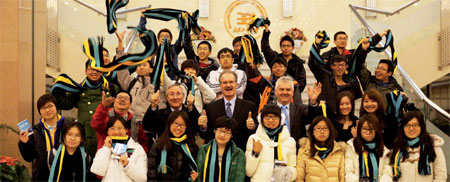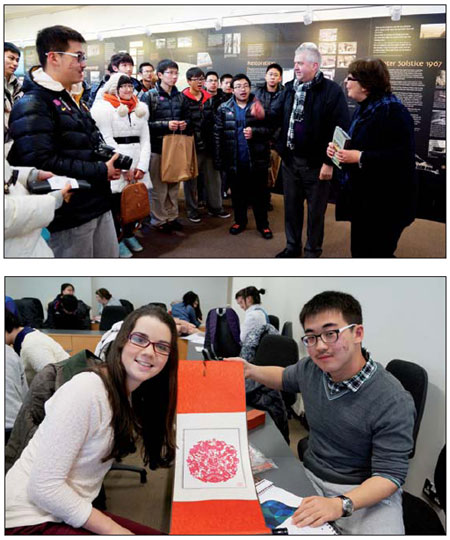Things best done together
Updated: 2013-05-17 09:53
By Ji Xiang (China Daily)
|
||||||||
|
Students and teaching staff celebrate the opening day of the first semester at the Beijing-Dublin International College. Provided to China Daily |
|
Top: Chinese students at BDIC tour cultural heritage sites in Ireland during an 11-day trip to visit UCD; Above: Cultural exchanges between students from China and Ireland. Photos Provided to China Daily |
A smart pairing of irish and chinese universities may have engineered a sea change in education
Like one of its three major courses on offer - the Internet of Things Engineering - a new joint academic venture between a Chinese and an Irish university looks to the future of international education and progress.
IoT, a "revolution of future networks that will connect all objects in our everyday life", is a top priority in the development strategies of many countries, and is incorporated in China's 12th Five-Year Development Plan (2011-15). Former premier Wen Jiabao heralded it as the "Wisdom of the Earth".
With an IoT market in China expected to be worth more than $163 billion by 2015, "unsurprisingly, there is a huge demand worldwide for professionals to work in this emerging and exciting field", states the bachelor of engineering prospectus for the new Beijing-Dublin International College.
There are now more than 1,700 Chinese-foreign joint educational organizations and programs in China, with 700 or so at or above undergraduate level. About 40 of these have created separate institutions, such as the foreign partner University of Nottingham Ningbo, or New York University Shanghai.
Surprisingly, BDIC, set up by the Beijing University of Technology and University College Dublin, is currently the only college in the capital to offer a dual degree at the undergraduate level.
BJUT may not have the cachet of China's top institutions, Peking and Tsinghua universities. Nor does UCD have the renown of Oxford or Harvard. But what they lack in historical reputation, they more than make up for in modern strategies and advance planning in international education.
And the Dublin-Beijing partnership was digitally quick off the mark when the opportunity rose following a twinning arrangement between the capital cities in 2011.
"The mayor of Beijing was very supportive of a collaboration between UCD and BJUT, and with that sort of encouragement, we were very happy to try to work with BJUT," says David FitzPatrick, provost at BDIC.
Liu Zhongliang, principal at BDIC, confirms that support from the Beijing government was vital to BJUT being selected as the partner in this joint venture.
"Though there is still a gap between us and top universities, such as Peking University and Tsinghua University, we are still a key municipal university, and confident," says Liu.
It helped that the central government was behind the idea, with then vice-president Xi Jinping present at the signing of the agreement in February last year.
By September, the new college was up and running with its first 24 students at the BJUT campus. Administration is largely left to the Chinese side, with the Irish mostly in charge of teaching.
UCD already had experience in this academic role and saw it as part of its international development program. In 2002, it set up a joint program with the Software School of Fudan University in Shanghai.
"UCD has tried to develop a stronger international engagement over the past five to six years," says FitzPatrick. "We see that as important because we want our students to be global citizens. We want them to be aware of other cultures, to have experiences of other cultures."
This resounds exactly with what the Chinese education authorities and parents want. For the wealthy and expanding middle class in 21st century China, that has been met by simply sending their offspring abroad to study.
More recently, it has meant foreign colleges and universities coming to China.
"Chinese students can have overseas resources without actually going abroad," says Wang Huiyao, director-general of the Center for China and Globalization, a public policy think tank based in Beijing.
"This both saves money and prepares the students for a future career in China. Also, new majors can be introduced, filling some major gaps in China."
Tuition fees for BDIC are 60,000 yuan ($9,760; 7,500 euros) a year.
"On the whole, joint programs act as an experimental pioneer in China's high education system," Wang adds. "It is good that they break some monopolies in the system and open the door to competition."
There's no set system to the matchmaking of Chinese and foreign academic institutions. It can happen in various ways. In the case of BDIC, there had been a number of exchanges before the marriage.
"Usually a lot of university programs of collaboration come about because you have some contact between academic staff, who get to know each other well, and it grows from that," says FitzPatrick.
Liu says that BJUT wanted to join with a university that mirrored and complemented its own disciplines - computer science and engineering - and would improve upon them through a new approach.
"Western professors are normally more down-to-earth in connecting with students, and the care they offer is real and of great value to them," says Liu.
For UCD's part, the arrangement is reciprocal regarding the education of their own students.
"We see our engagement in BDIC as giving UCD students the opportunity to come to Beijing to study, as well as for students in Beijing to come to Dublin to study," says FitzPatrick.
The BDIC bachelor's degree program, which includes four-year courses on finance, software and IoT engineering, has been set up at incredible speed. The first group of 24 students were admitted in autumn 2012, the formal agreement having only been signed in February that year.
"The speed of the development was the biggest challenge," FitzPatrick says. "Universities around the world are very similar; they have a certain pace. Academic staff like to think about things in great detail before making a big decision. So to work very quickly, to get everything achieved in time, and to get all the decisions made in time takes a lot of effort.
"The fact that we have some shared areas of expertise and academic excellence gave us a starting point, and we talked about trying to localize some of the degrees.
"The Internet of Things Engineering is not a degree subject that somebody from UCD would have suggested, because they are not aware of the interest in the Internet of Things in China, so BJUT would suggest that."
BJUT also ensured the curriculum would include courses required by China's Ministry of Education and more suitable for careers in China. They were aware of many Chinese graduates of institutions abroad who had returned to work in China but did not have an appropriate or adaptable degree.
A degree from both the Beijing and Dublin universities would also be an advantage for any student wishing to pursue Phd programs overseas or in career opportunities in multinationals, or any company anywhere.
However, attracting or targeting the right students is crucial for the success of the joint venture. Standards are not only restricted to the financial and academic levels of the students and their families.
"We are looking for academically excellent students; that is the first criteria. But we also want them to be interested in learning a whole subject through English, and to develop English skills and be really confident in English," says FitzPatrick.
Liu concurs. "We want them to be independent and open-minded. In today's world, the road to globalization lies there for every university, this is what the times call for," Liu says.
Zhang Yifei is among the first intake, and following their trip to Ireland earlier this year, is already noting the differences and benefits of "dual education".
"I have found the Irish teachers are more comfortable taking a practical approach rather than the theoretical," Zhang says. "They give us a lot of encouragement, and make the courses engaging, even amusing."
FitzPatrick says: "I suppose ultimately we want students who will hopefully take on what we see as the attributes of the UCD students; that they are confident and academically excellent, but also have this wider perspective, the global engagement and the ability to move between cultures and to influence both cultures."
UCD administrator Michael Garvey's role includes visiting Chinese high schools to recruit potential students. He has lived in China for seven years and knows how differently the two educational systems work.
"Cultural clashes are going to happen because this is a new project," he says. "It is a learning process for both sides. But working with Fudan University has given us a lot of experience in collaborating with partners."
jixiang@chinadaily.com.cn
(China Daily 05/17/2013 page10)

 Michelle lays roses at site along Berlin Wall
Michelle lays roses at site along Berlin Wall
 Historic space lecture in Tiangong-1 commences
Historic space lecture in Tiangong-1 commences
 'Sopranos' Star James Gandolfini dead at 51
'Sopranos' Star James Gandolfini dead at 51
 UN: Number of refugees hits 18-year high
UN: Number of refugees hits 18-year high
 Slide: Jet exercises from aircraft carrier
Slide: Jet exercises from aircraft carrier
 Talks establish fishery hotline
Talks establish fishery hotline
 Foreign buyers eye Chinese drones
Foreign buyers eye Chinese drones
 UN chief hails China's peacekeepers
UN chief hails China's peacekeepers
Most Viewed
Editor's Picks

|

|

|

|

|

|
Today's Top News
Shenzhou X astronaut gives lecture today
US told to reassess duties on Chinese paper
Chinese seek greater share of satellite market
Russia rejects Obama's nuke cut proposal
US immigration bill sees Senate breakthrough
Brazilian cities revoke fare hikes
Moody's warns on China's local govt debt
Air quality in major cities drops in May
US Weekly

|

|










